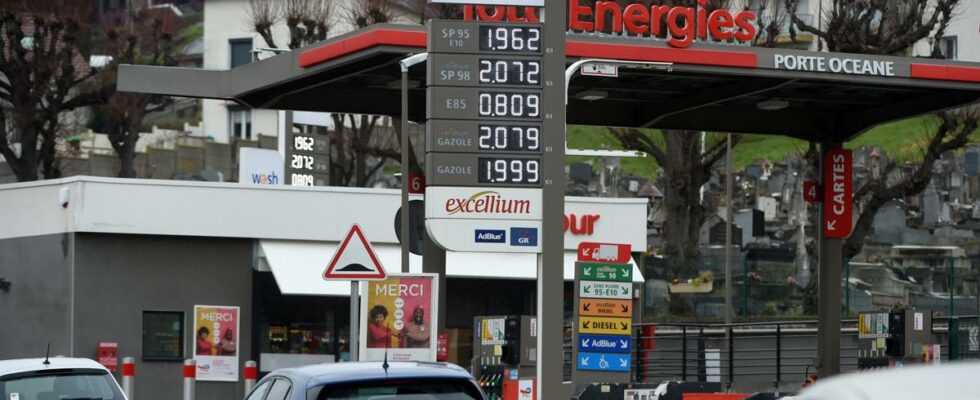Last week, the liter of diesel cost, on average, 1.88 euro, and that of SP98 approached the symbolic bar of two euros.
The rising fuel prices will have the effect of a crushing blow for motorists. For the tenth consecutive week, the average refueling bill increased again at the beginning of March. According to the latest data communicated on Monday by the Ministry of Ecological Transition, the liter of diesel soared last week by 14 cents, from 1.7415 to 1.8831 euro.
The massive increase takes the bill to unprecedented levels, approaching the 1.9 euro per liter mark. Same observation for the other fuels: the liter of SP95 reached on average, last week, 1.8889 euro, and that of SP98 1.9558 euro. By way of comparison, a liter of diesel cost 1.54 euros on average at the start of 2022, and that of SP95 1.63 euros. An increase, respectively, of 22% and 16% in just three months. In addition, a liter of diesel is now more expensive than that of SP95-E10, by about a penny.
SEE ALSO – Presidential 2022: Zemmour wants to block gasoline prices at 1.80 euros per liter
Read alsoGasoline or diesel: where to find fuel at the best price near you?
The latest records have been shattered, and the levels that led to strong disputes in November 2018 – 1.53 euros for diesel, 1.57 euros for SP95 – now seem derisory. According to precise government data, the prices of liters of diesel, SP95 and SP98 exceed or come close to the symbolic bar of two euros in many stations. In Paris, this is the case in almost all of the points of sale listed. From Ain to Finistère via Gironde, Rhône and Aisne, this level is found almost everywhere in the country. The curve flies away, and no one knows how far it will be able to climb.
A significant and continuous increase
This dynamic can be explained in particular by the crisis in Ukraine. While demand for raw materials remains strong, markets are watching closely the attitude of Russia, one of the main oil producers and exporters in the world. In January, the barrel of Brent was trading on average at nearly 87 dollars, its highest level since 2014. Since then, the continuation of hostilities and the announcement of discussions “very activebetween the European Union and the United States on a possible embargo against imports of Russian oil caused prices to soar: on Monday morning, the barrel of Brent briefly exceeded the symbolic bar of 130 dollars and approached its historic record. , before descending slightly. Unheard of since 2012.
The prospect of a rapid drop in prices is receding, as the war in Ukraine becomes increasingly violent: “the mythical bar of 2 euros is in everyone’s mind. We are getting there this week in Paris, said Monday the boss of the E.Leclerc centers, Michel-Edouard Leclerc, on FranceInfo . There will be an increase of 8 to 10 cents in all stations in France. And the trend is up“added the businessman.
Read alsoThe Swedish revolt against overpriced fuels
For now, the European Union remains heavily dependent on Russian oil. On average, the 27 import between a quarter and a fifth of their black gold from this country, a proportion that varies greatly according to the nations. In 2019, it climbed to more than 50% for six countries, including Poland, Bulgaria, Finland and Romania. At the same time, Germany imported a quarter of its oil from Russia, Italy 15%, and France 13%. France depends mainly on Algeria, Saudi Arabia and other nations, making Paris less dependent on Moscow compared to Berlin.
A topic of the presidential campaign
For its part, the State leaves the door open to new aid: we are “ready to do more“, said the Minister of Economy and Finance, Monday, on BFMTV. “We will provide a response to all French people who are most affected by the crisis. […] But it won’t be no matter what, pouring gasoline on a fire“, nuanced Bruno Le Maire, specifying that the measures would be “targeted“. On Friday, her colleague Barbara Pompili noted that aid on “fuel are part of the resilience plan that the Prime Minister will announce” this week.
Still, the protection of purchasing power and the inflation that has been affecting energy prices for several months have become central issues in the presidential election. Abolition of VAT on the TICPE – the famous “tax on tax-, price freeze, taxation of energy giants, lower taxes… Each candidate goes with his proposal. The government has already closed the door to most ideas, including a reduction in fuel taxation, a track deemed too expensive by Bercy. It would also be too difficult to go back and increase the levies again, once the crisis is over, it is argued.
SEE ALSO – Rise in gas, electricity and fuel prices: Jean Castex will present his resilience plan next week
